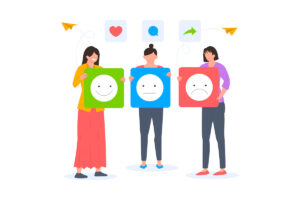Just being in a certain group and belonging certainly aren’t synonymous. You can be surrounded by people, but still feel lonely or isolated. We should be more selective about the groups and tribes we look to be a part of.
Dogged determination to belong somewhere that doesn’t feel right or complement your principles and ethics can start to affect and compromise your own self-worth. A sense of belonging is a privilege, not a guarantee.
Acceptance
What is belonging? At its essence, it’s based on acceptance – acceptance of your role within a group and the acceptance of others towards your participation. And belonging is a basic human need. Humans need to feel like they have a sense of belonging; otherwise, alienation and loneliness can insidiously creep into daily life.
Being accepted is a powerful feeling and seeking it out can take up lots of energy – especially if you’re looking in the wrong places. But when it’s found and maintained, belonging can bring increased levels of happiness, motivation, participation and have good health benefits too.
[Tweet “Being accepted is a powerful feeling and seeking it out can take up lots of energy”]
A sense of belonging can be found in lots of different places, depending on preference. The digitization of our society has led to people who existed on the fringes literally and figuratively, being able to connect with other like-minded individuals and create bonds.
For some people, belonging to a community has to be a tangible thing with physical boundaries and ‘real’ people, but for others, belonging in communities online can help to satisfy a need for acceptance and belonging too.
Exclusion
By knowing what it means to belong in a group or friendship and accepting others on that basis, by its nature knowing what it means to belong also means knowing what ideas and principles don’t belong in your group/relationship.
However, acceptance isn’t necessarily about agreeing with each other on everything. It’s about how you deal with each other’s different ideas and debate and respect each other.
Measuring belonging can be just as much about knowing what doesn’t belong and which people don’t suit a dynamic. For a group to exist, there must be boundaries built on who doesn’t make a good fit.
Some people actually feel a sense of belonging by being able to decide and exclude others because of a set of pre-determined ideas about who should and should not be accepted into a group.
And it’s this sense of exclusion that can be incredibly harmful to those that experience it. I’m pretty sure we can all think of examples from the past where we’ve not felt welcome or felt excluded. It could be as far back as not being allowed to play with a group of kids at pre-school.
The funny thing is though, these small moments can have a big impact on our lives and most of us can still remember these events because they were especially painful and memorable.
Self-Worth Impact
It’s the determination to forge a sense of belonging in groups that are not accepting of us or don’t share the same values that can be damaging to our self-worth in the long-run. By trying to fit into groups that don’t compliment us, we can start to water down our own personality and unique skills to try and be more like others in a group.
Anyone that’s ever tried to pretend that they’re something they’re not (all of us?) can tell you that it becomes more and more mentally exhausting as time goes by.
Being in a workplace, friendship group, family, class where you feel like belonging is in direct opposition to your sense of self and principles can be a really painful experience.
Over time, your self-worth suffers when you’re not surrounded by or at least in regular contact with people that bring out the best in your and make you feel valued as a person. Trying so desperately to be part of something that doesn’t recognize your value, skills, and qualities can be a very lonely place.
You start to question whether you’re the one with the problem, but often, it’s a case of not being in the right place and not being around the right people.
Finding Belonging
It takes an effort to belong. There are some near-perfect scenarios where you find your people straight away and you hit it off like old friends instantly. But most of the time, you have to put in the work to belong and find groups and relationships that work for you, as well as the other people involved.
[Tweet “You can validate others by learning and encouraging others to expand on their ideas.”]
Active listening is a really important trait to use. People love to feel listened to and valued – asking about people’s lives and stories is a great way to learn about others.
Being open-minded matters too – belonging can be boosted when you’re open to different ideas, maybe ideas that you don’t agree with. You can validate others by learning, communicating and encouraging others to expand on their ideas.
Final Thoughts
We all deserve to experience a sense of belonging because it helps us to keep in touch with who we are and what we appreciate in others. Belonging can be found everywhere, it takes effort and vulnerability sometimes to find it.
If you find yourself compromising and damaging your feelings of self-worth over time as you try to belong in certain scenarios, it’s important and totally ok to step back and assess whether a group is really beneficial to your own worthiness and value system.






